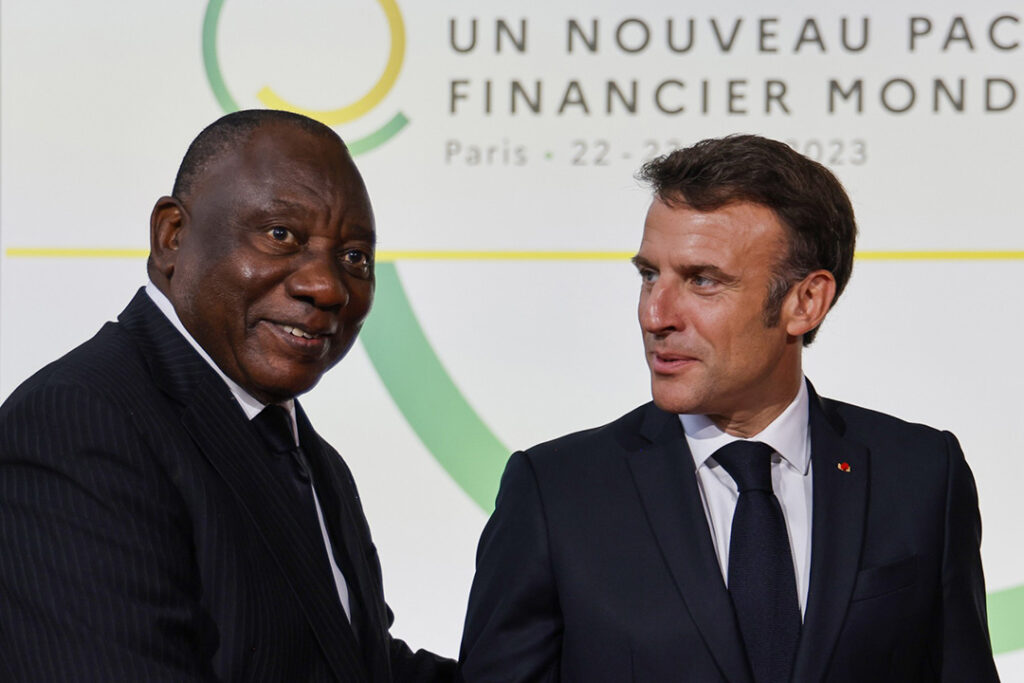In November 2021 on the side of the UK-hosted COP 26 climate summit, the governments of France, Germany, the United Kingdom, the United States, and the European Union (the International Partners Group – IPG) agreed to financially support South Africa to decarbonise its economy. The new Just Energy Transition Partnership (JETP) was the first example of collective action by countries in the Global North to subsidise and support a country in the Global South to achieve its nationally determined contribution (NDC) target. Since then, a new JETP with Indonesia has been announced, and there are plans for others including for India, Senegal, and Vietnam.
Such partnerships have the potential to offer a much-needed conduit for finance from developed countries into middle-income nations grappling with the dual pressures of decarbonisation and citizens’ demands for accelerated economic development. They are borne out of an acknowledgement of climate inequality, and increasingly G7 nations’ wish to show real action from beyond moral obligation to showing political and commercial opportunity and pragmatism. But do they offer ‘justice’? And what can the South African experience offer other countries seeking finance? This article assesses the significance of the South African agreement in terms of multilateral climate negotiations, the limitations of addressing the issue of “justice”, and the challenges of realpolitik in delivery.
Developing countries have grown increasingly frustrated with multilateral climate negotiations. At COP15 in Copenhagen in 2009, developed countries committed to mobilising $100 billion per year for climate action in developing countries. This target was initially to be achieved by 2020 but was extended to 2025. Very little progress has been made, and green finance flows remain pitifully small. There is a growing sense amongst African representatives that they have been failed by multilateral action, and are looking for alternative means to access much-needed assistance.
African leaders emphasise that the continent bears the brunt of the impact of climate change – from increased droughts and flooding to heightened climate insecurity and conflict risk. Their ask in multilateral forums is characterised by the demand for compensation to offset suffering endured as a consequence of developed industrial countries’ emissions.
Narratives of global inequality instinctively resonate with South Africa’s political leadership, but the structural differences in its economy and the scale of CO2 emissions make it difficult for the country to align with continental bargaining positions. South Africa is the most industrialised country on the continent and derives more than three-quarters of its electrical energy generation from coal. This outlier status marks it as an important test case. Furthermore, the country has a well-established financial sector and deep capital market that international assistance can leverage.
For global partners, the attractiveness of South Africa is clear. It is a high emitter but has an ageing fleet of coal power stations, a large proportion of which will come to the end of their life by the end of the decade. The country is already grappling with an acute power shortage and is seeking international investment in the sector. It has world-class opportunities in renewable energy and significant potential to produce green hydrogen. It is one of the most cost-effective places for achieving carbon reduction.
The emphasis on justice within the partnership reflects the international acknowledgement that decarbonisation in South Africa will require a large-scale employment transition and the deconstruction of entrenched political interests within the coal power complex. The “just” element is articulated as ensuring that those most directly affected by a transition from coal – workers and communities, including women and girls – are not left behind. However, international partners have been unable to effectively flesh out this aspect beyond the headline intention. The President’s Climate Commission has adopted a broader definition that includes forms of redistributive and restorative justice. The scale and structure of the financial support could be insufficient to overcome regional and domestic challenges and the ambitious three-to-five-year timeline is in jeopardy.
At a regional level, South Africa accounts for around 85% of power generation, exporting electricity to its neighbours and beyond. As such, it is in effect importing their emissions. On the flip side, regional players have argued that a greater amount of funding should be targeted at green generation in other countries, thus lowering their dependence on South African dirty generation.
The argument that higher employment is achievable under a green energy future than the coal-fired present has been well made. For example, energy experts Tobias Bischof-Niemz and Terence Creamer project that under what they define as a “least cost” transition, where 80% of the country’s electricity is produced by solar PV, the number of jobs in running solar alone would be 108,000 – up from 49,000 currently employed by Eskom in power stations. However, jobs across the two energy sectors are not like-for-like – with notable differences in skills requirements and wages. Furthermore, the fact that these would be more diffuse across the country presents a socioeconomic and political challenge on which domestic actors must take the lead.
Several multi-stakeholder processes, including those led by trade unions, have begun programmes for re-skilling workers in areas projected to face the worst job losses – in particular Mpumalanga province, where most of South Africa’s coal power is produced. Community programmes are important but must be extended to reflect the role of migratory labour from other provinces and countries. Covid travel restrictions broke the patterns of migratory labour to an extent. But the “losers” from the employment transition are widely distributed and not just centred around operations.
Energy justice for many South Africans is more deeply rooted in national social history rather than international climate discourse. The mining industrial complex the government inherited after the democratic transition had been the cornerstone of an exclusionary economy. Expanding access to electricity to previously cut-off communities was a priority for the ANC in the early years of its tenure. According to the World Bank, access to electricity rose from 57% of the population in 1996, to 85% in 2012. However, for the past decade, access has plateaued, and underinvestment and corruption have led to energy shortages and loadshedding.
State ownership and control of the energy system and tenure processes have been the practical frontline of the ideological push for economic transformation. The scale of Eskom’s coal purchasing power has been an important tool to impose ownership and empowerment requirements for contractors and suppliers. As a result, the coal sector is the most transformed of the nation’s mining industries. These are gains that the government is reluctant to roll back on. The shift to renewable energy has been conducted primarily by expanding independent power producer (IPP) programmes and increasing generation quotas, offering significantly weaker opportunities for imposing transformative action.
The Renewable Energy Independent Power Producer Procurement Programme (REIPPPP) was introduced in 2011. Contracts are awarded through procurement rounds. The sixth round in 2022 not only increased the total amount aimed to be produced overall but also proposed to scrap the threshold for distributed energy generation of 100 MW, meaning that large-scale power plants could be built without a licence. While this has been seen as a boost to the transition, it has also been seen as further loosening the state’s grip over energy generation and therefore control over economic transformation.
This has created a context where the objectives of international finance stand at odds with some domestic political forces. Reductionist depictions of this tension often portray the Minister for Energy and Mining Resources Gwede Mantashe as the last defender of the ancien regime against the international forces of change. But legitimate questions remain on the connection between energy and economic transformation.
The socioeconomic transformative potential of the JETP has been articulated but not actualised. Further studies are required to assess the domestic absorption capacity of the sector for inward investment. There is limited understanding of the number and capabilities of black-owned enterprises that have the ability to take a project all the way from inception to generation, and thus where the gaps are that require support. The interaction with other political debates around land ownership and access are also poorly understood by international investors.
Generating national buy-in to the process has been garnered through successive public consultations on the broader issues of green transition. Since the introduction of these issues into the public discourse through the national development plan, there has been wide outreach to stakeholders for input into the process. The scale of the proposed changes has also led to the proliferation of advisory councils and committees, both at a national level and within institutions and organisations.
In February 2022 President Cyril Ramaphosa established the Presidential Climate Finance Task Team (PCFTT) to develop the investment plan required for unlocking the JETP financing. The PCFTT is supported by an independent technical secretariat, working collaboratively with the National Planning Commission, and the separate Presidential Climate Commission.
This advisory architecture has been instrumental in creating the framework for transition, but it has largely existed outside of the ruling party structures. Whilst there is support for transition within parts of the party, the resolutions of the 2022 party conference place Eskom at the centre of transition and controversially regard coal as part of the long-term energy mix, despite international pressure towards zero coal. The parliamentary committee on mineral resources and energy has shown scepticism on financing for transition and concern about what it sees as the abrupt decommissioning of coal power plants.
The financial offer of the JETP has been seemingly insufficient to fast-track energy transition in South Africa. The government’s investment plan presented at COP27 in 2022 was an important and requisite step towards unlocking the pledged finance. But in reality, the plan was more of a framework for the transition than a list of bankable projects in which international partners could start investing. The slow progress in releasing funds has been hindered by the structure of the finance –mostly in loans and backed guarantees, with only 3% in direct grants. The ANC has resolved that green finance should be structured in a manner that avoids worsening the country’s sovereign debt position.
As other countries look to South Africa as a potential model in principle, it is too soon to tell if international action and financial support can overcome vested interests within the domestic socio-political context in receiving countries. The JETP was intended to provide finance to support a transition on domestically defined terms. It has catalysed debates and crystallised thinking, but the process of energy transition in the country pre-dates the pledge of finance and ultimately relies on a cohesive national process.
South Africa shows that the transition to a green economy not only requires financial support, but it depends on national political will and citizen engagement. It also highlights that the sequencing and ownership of processes are important. Commitments from global partners to support processes remain limited by their inability to overcome domestic constraints and political vested interests.

Christopher Vandome is a Senior Research Fellow on the Chatham House Africa Programme. He is also a PhD candidate in International Relations at the University of the Witwatersrand, Johannesburg, writing on mining investment in Africa.



